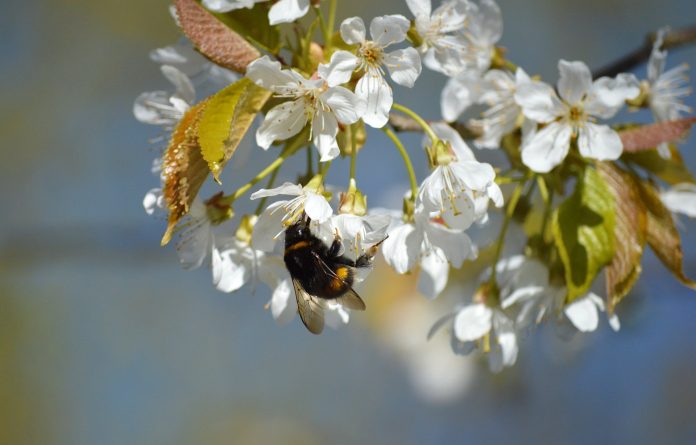Time magazine posted a story saying that climate change is increasing the misery allergy sufferers face each season by lengthening the season and boosting plant production. This is at least partially true. Climate change is one factor leading to earlier spring arrival and a longer allergy season. Climate change is also responsible for a general greening of the Earth, a benefit of climate change that comes with the drawback that some people suffer longer or more severe allergies.
The Time story, “Yes, Climate Change Really is Making Your Hay Fever Worse,” follows a narrative that many mainstream media outlets have trotted out each spring for the past decade or so claiming that climate change is exacerbating allergy sufferers’ suffering by lengthening the allergy season. Time writes:
Climate change is bad news for a lot of reasons—the droughts, the floods, the heat, the hurricanes. And then, too, there’s all the sneezing. If you suffer from hay fever—or allergic rhinitis (AR)—and have found your symptoms growing worse in recent years, you’re not alone. Increasingly, health care professionals are concluding that as global heat increases so too do allergy symptoms.
In industrialized countries, hay fever diagnoses are rising by 2% to 3% per year, costing billions of dollars in health care and lost productivity. Spring pollen season, which typically begins in late February or early March and ends in early summer, is now arriving as much as 20 days early in North America.
This post will not address Time’s throwaway assertions that climate change is bad news because of its impacts on droughts, floods, heat, and hurricanes. Those claims have been thoroughly debunked by research and data cited in dozens of Climate Realism and Climate at a Glance documents on those topics, and are not the main crux of Time’s story, being climate change’s impact on allergies.
A new study in the journal The Laryngoscope, serves as the basis for Time’s assertions about climate change making allergies worse. The study, which serves as somewhat of a survey of recent literature, concludes that “global warming has been shown to affect inflammatory upper airway disease, specifically allergic rhinitis,” due to increased pollen emissions and a longer pollen season. Time’s reliance on this particular study is the only new twist it brings to the discussion of global warming and allergies.
To be clear, climate change is almost certainly contributing to the longer allergy season because it is responsible for an earlier arrival of spring and a longer growing season for plants. However, that is not the whole story.
As discussed in “No, Axios, Climate Change Is Not Making Atlanta’s Allergy Season Worse,” other factors driving the increase in reported allergies are urbanization and land use changes—particularly the Urban Heat Island effect and types of urban landscaping that induce allergic reactions in some. The increase in reported allergies is largely, although not entirely, an increase in urban allergy responses. NASA data clearly show that fast growing cities experience significantly higher temperatures than surrounding rural areas due to human-made structures retaining heat. This localized warming results in early spring blooming and longer pollen season. Global warming isn’t at the core of this trend.
Also, as pointed out in a Climate Realism post, pollen season is largely dependent on precipitation levels and natural climate variability, not just temperature. Climate models have proven consistently unable to account for local and regional factors that contribute to allergies. Indeed, a 2022 Climate Realism analysis explained that that pollen trends vary by region and that some areas are actually experiencing less pollen, not more.
In the end, although climate change has almost certainly contributed somewhat to allergy sufferers experiencing longer, perhaps even more severe, allergy seasons, this harm is a side effect of the beneficial greening of the Earth that a warmer planet with higher carbon dioxide (CO2) levels has driven. Scientists have documented a substantial greening of the Earth in recent decades as more atmospheric CO2 and warmer temperatures facilitate more plant growth. A side-effect of more plant life is more pollen in the air. More pollen may aggravate allergies and asthma, but few would argue that a world with fewer plants is better than a world with more abundant plant life.’
Climate Realism has posted a number of articles during past allergy seasons detailing how global greening has contributed to the largest decline in global hunger in history. Greater plant growth not only removes carbon dioxide from the atmosphere, but the allergy causing pollen it emits is great for pollinating insects like bees, and birds.
More directly, copious peer reviewed reports confirm that cold temperatures are responsible for 10 times more deaths than hot temperatures. As a result, as the number of freezing days has declined, the number of deaths attributable to non-optimum temperatures has also fallen sharply, preventing hundreds of thousands of deaths each year.
Focusing on a drawback of a greener world, worsening allergies, while ignoring its broad benefits of more trees, shrubs, grasses, flowers, and food crops, represents poor journalism. Global greening has contributed to the largest decline in global hunger in history, and the greater plant growth not only removes carbon dioxide from the atmosphere, but the allergy causing pollen it emits is great for pollinating insects like bees, and birds. Most people, including many allergy sufferers, I suspect, would likely agree that harsher allergies, while unwelcome, are a small price to pay for a more fecund world. As an allergy sufferer myself, I’ll stock up on allergy medicine and enjoy more time outdoors.
















